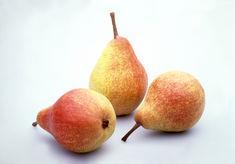
Dutch marketer The Greenery says it is making good progress in developing a global network of pear producers capable of supplying protected, licensed variety Sweet Sensation to customers throughout Europe and around the world. The red variety is well on the way to being established as a commercial-grade, year-round crop grown in European countries, including Belgium, France, Italy, the Netherlands and the UK, as well as in the southern hemisphere.
Last month, licence-holders from those countries came together for their first marketing and sales meeting, reinforcing their commitment to pushing forward the required expansion in Europe. For its part, The Greenery is also looking to extend its grower network further; last month it was in discussions to plant trees in Slovenia, with similar partnerships likely in Romania, Spain and Turkey in the near future.
“Our total plan for Europe is to have around 1,750ha spread across the northern hemisphere,” confirms Bert Wilschut, The Greenery’s top-fruit product manager. “But, per country, the amount of hectares per licensee is in fact so small that it will remain a niche product in each of those countries. The real challenge will be, for example, to meet demand from our customers all over the world with product from different countries.”
The Greenery is also establishing production of Sweet Sensation in Argentina, Chile and South Africa, a move which it says should enable it to guarantee year-round supply for its European customers in the near future. Sales to clients in other international markets, like North America and Asia, may also be possible once those southern hemisphere supply lines are up and running, Wilschut reveals, while similar production projects that have been proposed for South Korea and China would theoretically present an interesting opportunity to sell to the potentially lucrative Japanese market.
Discovered by chance in 1992 by grower Simon Broertjes - who sadly passed away just a few years later - the Rode Doyenne van Doorn variety now marketed as Sweet Sensation was originally owned by Next Fruit Generation, a group set up specifically to sell and promote the fruit and which three months ago sold the variety’s IPR, breeding and branding rights to The Greenery.
Uta, another protected variety branded as Dazzling Gold, has since been added to the project’s portfolio and is now at the commercial trial stage. It is set to be promoted more actively with a targeted marketing campaign next year.
The Greenery views the future development and expansion of its club pear variety programme very much as a long-term project: “The deal we have giving us IPR rights to the Sweet Sensation variety and brand is until 2039. Our return on investment will probably not happen until after 10 years, so around 2018. It’s also still an enormous learning curve. Every year, we’re learning new techniques.”
Indeed, acquiring new methods of production that offer significantly better yields and improved efficiency are said to be one of the major factors in the success of The Greenery’s business model for the pears. “The interest for The Greenery is not only in the varieties, but also in the worldwide network. With these varieties we also introduce new production techniques worldwide,” Wilschut explains.
The company certainly appears to have convinced most partner growers that intensive planting, enhanced methods of cultivation like fertigation and wet pollination, and technological improvements such as mechanical pruning are as important as creating a strong brand or finding customers. The many threads of information that The Greenery has gleaned about pear production over the years - drawing on the combined knowledge of growers in a number of different countries - have been stitched together, providing licence-holders with a clear advantage, he adds. “You can almost consider our technical support as part of this project. In every country where the pears are being grown, people say the strength of the project is the high level of productivity we can achieve, backed by marketing and sales to build and develop demand.” -



